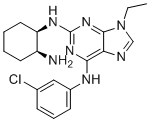
CGP-74514A
CAS No. 190653-73-7
CGP-74514A( CGP 74514A | CGP74514A )
Catalog No. M12989 CAS No. 190653-73-7
A potent, dual CDC-like kinase (CLK)/CDK inhibitor with IC50 of 148, 111, 104, 382 and 573 nM for CLK1, CLK2, CLK4, CDK1 and CDK4, respectively.
Purity : >98% (HPLC)
 COA
COA
 Datasheet
Datasheet
 HNMR
HNMR
 HPLC
HPLC
 MSDS
MSDS
 Handing Instructions
Handing Instructions
| Size | Price / USD | Stock | Quantity |
| 100MG | Get Quote | Get Quote |


|
| 200MG | Get Quote | Get Quote |


|
| 500MG | Get Quote | Get Quote |


|
| 1G | Get Quote | Get Quote |


|
Biological Information
-
Product NameCGP-74514A
-
NoteResearch use only, not for human use.
-
Brief DescriptionA potent, dual CDC-like kinase (CLK)/CDK inhibitor with IC50 of 148, 111, 104, 382 and 573 nM for CLK1, CLK2, CLK4, CDK1 and CDK4, respectively.
-
DescriptionA potent, dual CDC-like kinase (CLK)/CDK inhibitor with IC50 of 148, 111, 104, 382 and 573 nM for CLK1, CLK2, CLK4, CDK1 and CDK4, respectively.
-
In Vitro——
-
In Vivo——
-
SynonymsCGP 74514A | CGP74514A
-
PathwayCell Cycle/DNA Damage
-
TargetCLK
-
RecptorCLK
-
Research Area——
-
Indication——
Chemical Information
-
CAS Number190653-73-7
-
Formula Weight385.9
-
Molecular FormulaC19H24ClN7
-
Purity>98% (HPLC)
-
Solubility——
-
SMILESCCN1C=NC2=C(N=C(N=C21)NC3CCCCC3N)NC4=CC(=CC=C4)Cl
-
Chemical NameN2-((1R,2S)-2-aminocyclohexyl)-N6-(3-chlorophenyl)-9-ethyl-9H-purine-2,6-diamine
Shipping & Storage Information
-
Storage(-20℃)
-
ShippingWith Ice Pack
-
Stability≥ 2 years
Reference
1. Shi Y, et al. Bioorg Med Chem Lett. 2017 Feb 1;27(3):406-412.
molnova catalog



related products
-
KH-CB19
KH-CB19 is a potent and highly specific inhibitor of CDC2-like kinase isoforms 1 and 4 (CLK1/CLK4) with IC50 of 20 nM (CLK1).
-
MU1210
MU1210 (MU-1210) is a potent and highly selective inhibitor of cdc-like kinases (CLKs) with IC50 of 51 nM.
-
K00546
K00546 is a potent inhibitor of the CDC2-like kinase CLK1 and CLK3 with IC50 of 8.9 and 29.2 nM, respectively.



 Cart
Cart
 sales@molnova.com
sales@molnova.com


